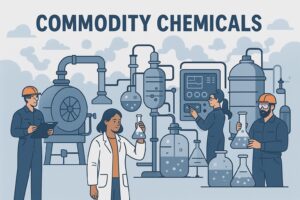Business Overview
Platinum Industries: While specific details about Platinum Industries‘ business model and segments were not explicitly provided, key financial insights indicate its strong performance metrics, such as an impressive return on equity (ROE) and return on capital employed (ROCE), suggesting a robust financial position. However, the company’s reliance on substantial working capital and external funding for expansion points to significant cash flow challenges.
Aarti Industries Limited: Aarti Industries stands out as a leading manufacturer of specialty chemicals, holding a global presence. The company’s product offerings are vast, catering to industries like agrochemicals, polymers, additives, surfactants, pigments, and dyes, which underscores its diversified and robust business model. The commitment to sustainability and strategic growth initiatives indicates a forward-looking approach to business.
Financial and Market Performance
Platinum Industries:
- Exhibits high ROE and ROCE, demonstrating efficient capital utilization.
- Faces operational cash flow issues, indicating possible financial management concerns.
- Employs significant proceeds from an initial public offering for manufacturing expansions, signaling growth ambitions despite financial constraints.
Aarti Industries Limited:
- Demonstrates a solid revenue stream with strategic agreements enhancing its financial stature.
- Shows fluctuating profit margins and return ratios over the years, reflecting varying operational efficiency and market conditions.
- Engages in substantial capital expenditure for expansion and introduces new products to maintain and grow its market presence.
Future Outlook and Strategic Plans
Platinum Industries seems to be focusing on geographical and capacity expansion, as indicated by its plans to establish manufacturing facilities. However, its cash flow concerns might necessitate careful financial planning and execution to sustain growth.
Aarti Industries Limited has laid out clear strategic plans, including significant capital allocations for chemical projects, site development for business expansion, and new product introductions. These endeavors aim to bolster its market position and financial performance, demonstrating a proactive approach to growth and innovation.
Financial Indicators
Platinum Industries: Platinum Industries has shown significant financial growth and improvement over the recent years, particularly noted around its recent IPO activities. The company experienced commendable growth in its profit after tax from 2021 to 2023, with figures rising from INR 48.15 million to INR 379.05 million. The financial stability of Platinum Industries is further highlighted by its healthy ratios, including a ROE of 92.68% and a ROCE of 85.37%. The debt-to-equity ratio stood at a relatively low 0.3007, indicating a sound financial structure, while the interest cover ratio was impressively high at 25.63. However, it is also noted that the company had zero percent profit growth and revenue growth over the past three years, which may raise questions about its growth consistency.
In terms of its offerings, Platinum Industries focuses on the manufacturing of CPVC and PVC stabilizers and related products, including various lubricants and metallic soaps essential for the processing of these materials. These products are critical in the construction, plumbing, and industrial sectors, reflecting the company’s significant role in these industries. The company’s market is underpinned by the robust global and Indian speciality chemicals sectors, projected to grow significantly in the coming years, providing a positive outlook for Platinum Industries.
For investors or industry observers evaluating Platinum Industries, these financial indicators and market positionings provide a compelling snapshot. Despite the noted limitations in profit and revenue growth, the company’s strategic focus on essential chemical products for key industries, combined with its successful IPO and solid financial ratios, outlines a profile of a potentially strong player in its market segment. However, as with any investment consideration, it’s crucial to look at these indicators within the broader context of market conditions and the company’s strategic direction moving forward.
Aarti Industries Limited: Aarti Industries Limited reported its financial results for the third quarter and the first nine months ended December 31, 2023. For this period, the company saw a slight increase in sales and revenue compared to the previous year, but there was a decrease in net income. Specifically, for the third quarter, Aarti Industries reported sales of INR 18,890 million and net income of INR 1,240 million. When comparing the nine-month performance year-over-year, there was a reduction in net income from INR 3,970 million in the previous year to INR 2,850 million. Despite these challenges, the company is engaging in various growth initiatives and capacity expansions to bolster its market position and financial performance in the upcoming periods.
In terms of share price and returns, Aarti Industries has experienced fluctuations over various time frames but has shown a general upward trend over longer periods. Notably, the company’s share returns over the past year have been positive, demonstrating the investors’ confidence and the market’s favorable response to its ongoing strategies and performance outcomes.
Aarti Industries also maintains a robust dividend distribution policy, with recent records indicating consistent interim dividend payments, reflecting its commitment to sharing profits with shareholders and underlining its financial stability and confidence in future growth prospects.
The company’s diverse portfolio and strategic initiatives, especially in specialty chemicals, position it well within the industry, despite facing a challenging external environment and competitive pressures. The management’s focus on strategic growth areas and operational efficiencies is key to navigating these challenges and capitalizing on market opportunities
Investors or interested parties should consider these factors, along with their own research and investment goals, when evaluating these companies. Note that this comparison is not a recommendation for investment but an analysis based on available data and should be used as a basis for further investigation.




